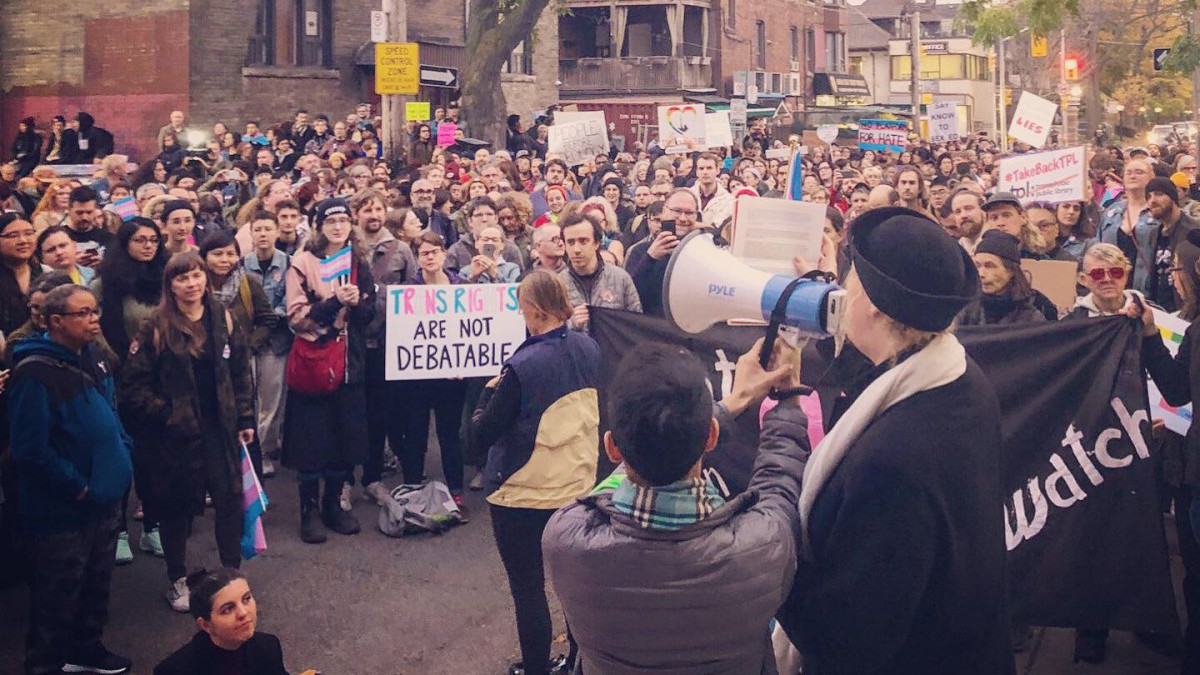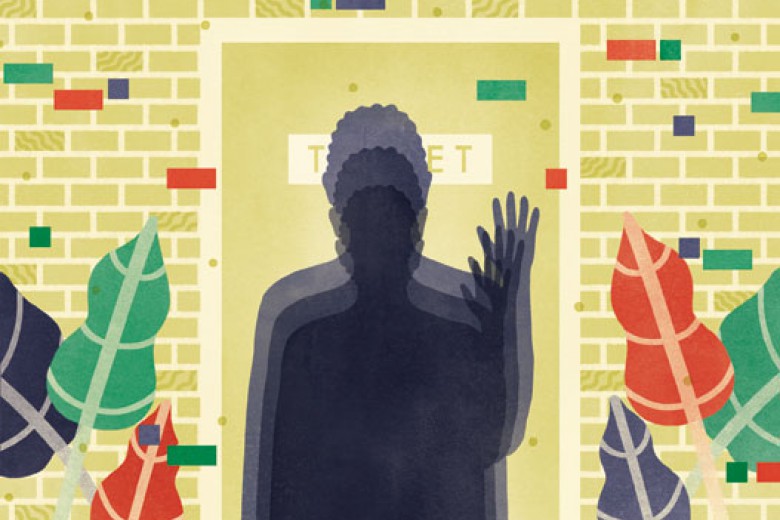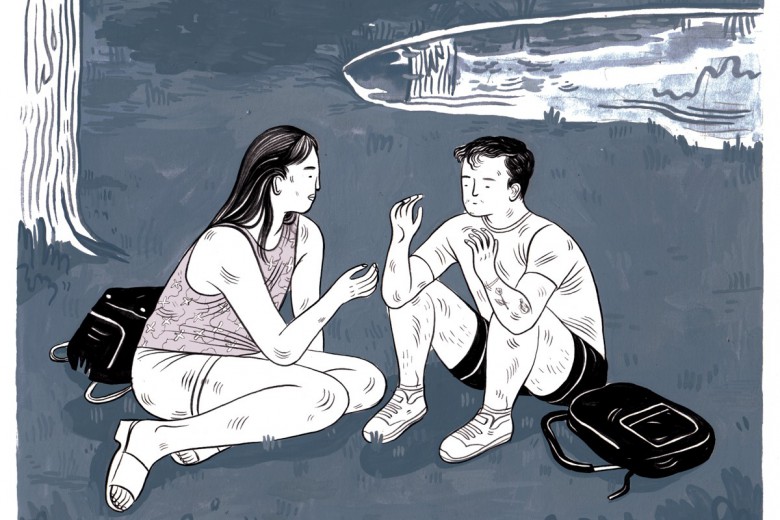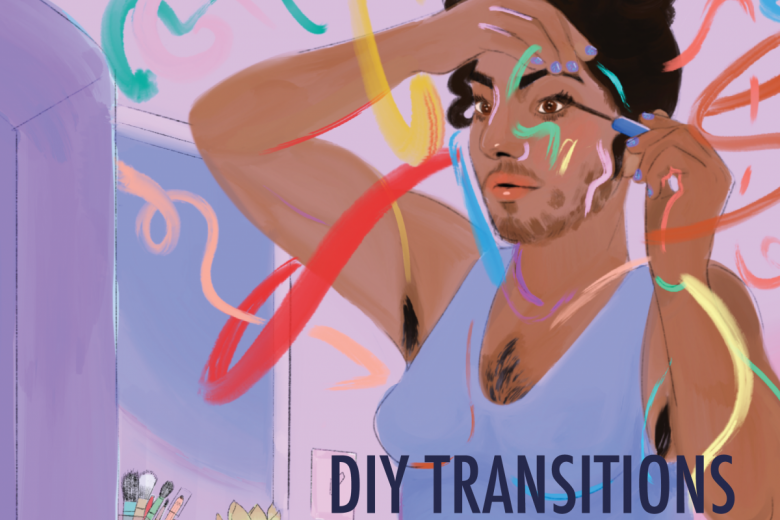This article has been adapted from a speech the author delivered at a rally preceding the #TakeBackTPL protest and read-in of trans writing on October 29, 2019, which they co-organized.
When an important civic institution like the Toronto Public Library book-washes trans-exclusionary thinkers like Meghan Murphy, it makes me – a non-binary transfeminine person – somewhat more vulnerable. But its downstream effects are an order of magnitude more damaging to my more marginalized trans siblings: trans women of colour; and Black, Indigenous, disabled, sex-working Two-Spirit and trans and non-binary people in general. There’s plenty of confusion around how exactly that material damage can flow from “mere speech” by high-profile transphobes. So let’s take a closer look.
We hear a lot of rhetoric about so-called free speech from earnest liberals and conniving fascists alike, a lot of lofty talk about compassion and dialogue across differing views. And in fact I’m very attached to those principles. But the principle of freedom of expression, as enshrined in liberal states’ constitutions, is fundamentally about limiting the power of the state to murder, maim, or imprison dissidents. Though there are some cases where the spirit of that principle is worth defending even in the absence of direct state involvement (in workplaces that operate like feudal tyrannies, for example, a union may be able to protect the liberty of workers to advocate openly for their own safety and dignity), freedom of expression certainly doesn’t require any given individual or institution to amplify a particular set of views.
But the principle of freedom of expression, as enshrined in liberal states’ constitutions, is fundamentally about limiting the power of the state to murder, maim, or imprison dissidents.
And it certainly doesn’t mean any given individual or institution is obliged to claim a false (unavailable) neutrality with respect to those views. Cities are political, public spaces are political; they’re founded on countless values-based affirmations and exclusions. In every moment of its existence, every political entity (including every individual human person!) is taking sides in a hundred implicit ways.
Trans-exclusionary thinkers most definitely take a side. But many of them seem confused about which side they’re on – a self-misunderstanding at least as profound as those they project onto trans people. They claim to consider themselves progressive, freethinking; often they seem to think they’re leftists who have been mistreated by the rest of the left over slender disagreements about the state’s policies to end gender-based discrimination. And so they feel ostracized, silenced, because they perceive that their erstwhile comrades have turned their backs on them.
What they fail to realize, these self-professed lapsed left-believers, is that we socialists aren’t their comrades at all: we’re fighting for a future wildly different from the one they want. The natural comrades of people like Meghan Murphy are conservatives, reactionaries like the columnists in the National Post and other right-wing media who defend her. If the transphobes simply glanced over their shoulder in good faith, they’d see that a large number of powerful people and institutions have their backs – and are more than prepared to amplify their message.
Transphobia is the norm in most versions of the nuclear family. It’s normative in many of the media outlets most closely aligned with the ruling class. Patriarchal ideology about gender, which is irreducibly transphobic and homophobic, dominates the old boys’ clubs of law and finance. To differing degrees but across the whole globe, transphobia and homophobia and misogyny operate murderously in tandem. Misogyny against trans women (misogyny and transphobia helixed with each other) is so common and so deadly that trans author Julia Serano gave it its own name: transmisogyny.
Trans-exclusionary thinkers most definitely take a side. But many of them seem confused about which side they’re on – a self-misunderstanding at least as profound as those they project onto trans people.
“But wait,” the faux-contrarians of the media say, “the university is full of politically correct people who will kill you if you mess up someone’s pronouns, and even Hollywood is now marketing stories about trans people!” It’s true that trans life has had a moment of popular visibility in a few countries of the Global North, where neoliberal states and markets have discovered they can profit from a certain cooptation and incorporation of a very narrow trans experience: typically a white, “middle-class,” capitalist, imperialist articulation of trans experience. Like so-called homonormativity – a term that captures the ways the state and capital, to stabilize themselves, offer junior associate status to a certain elite layer of mostly white cis queers (hello, Ellen DeGeneres) – this moment of trans legal recognition & popular visibility leaves so many trans people out: the vast proportion of trans people who live in poverty, who are incarcerated like Moka Dawkins, who are among the staggering numbers of racialized trans women murdered each year.
These are the people, in particular, whom Meghan Murphy’s rhetoric makes materially more vulnerable when it propagates stereotypes of trans people – and especially trans women and transfeminine people – as dangerous imposters. That rhetoric weakens the social basis of trans legitimacy, the cultural consensus that trans people should be listened to and supported on our own terms. People like Meghan Murphy know this. They know they’re engaged in a war over defining norms. Because it’s norms, ultimately, that give force to legislative recognition like Bill C-16, which enshrined anti-discrimination protections in Canada for gender identity and gender expression.
Every legal trans recognition win is in constant danger of being rolled back or rendered unenforceable when the values the legislation enacts lack a broad, firm base of public support. When capitalism is in crisis, when it lurches towards fascist reaction, like now, trans and gender-nonconforming people are always among the first to be attacked: as threats to the patriarchal order, the reproduction of the straight family, and so the survival of the nation (conceived in traditionalist, blood-and-soil terms). At least since the early days of the Third Reich, trans experience has been coded as perverse Jewish duplicity, Talmudic abstraction, a decadent, sterile falling-away from the wholesome gender clarity of hardworking, fertile Christians. As a Jewish trans person, and a non-binary one at that – so abstract! much confusing! very Talmudic! – I feel the struggle to defend trans lives is inseparable from the struggle against violent Christian white supremacy.
That rhetoric weakens the social basis of trans legitimacy, the cultural consensus that trans people should be listened to and supported on our own terms. People like Meghan Murphy know this. They know they’re engaged in a war over defining norms.
Where does the library come into this, again? The library is an institution that establishes norms. Transphobes know this. Some of those ’phobes appear in the guise of a distorted radical feminism – which actually breaks with important traditions of radical feminism, which weren’t biologically essentialist (Catharine A. MacKinnon: “Transpeople [sic] are doing their best to live and be loved under conditions in which people still pervasively believe the lie that gender is sex-based, meaning biologically-determined.”). Some of those ’phobes wear their patriarchal conservatism openly. All of them, however, feeling threatened by recent greater (conditional!) acceptance of trans experience, understand that the library can launder their transphobic views and reaffirm those views’ place at the centre of our society. The library can normalize them.
I want to suggest that our public library has a responsibility to resist this move. We couldn’t censor transphobes even if we wanted to: their views get vast coverage in the major newspapers, are all over the Internet. But our public institutions can and should resist such voices’ claim to the centre, their drive for legitimacy. When they claim the centre, they have more power to slander some of our most extraordinarily vulnerable community members as threats to safety and order. This is an atrocious politics for a library to defend, with murderous consequences.
To repeat: the abstract liberal value of freedom of speech does not absolve you in an absolutely unlimited way from having to pick sides in situations of injustice and oppression. You pick a side all the time, simply by your silence – even when you’re the public library. And if you’re the library and you pick the side that drives trans lives further into the margins, we the public are more than justified to exercise our own freedoms of speech and assembly in response: to #TakeBackTPL and demand better.




_780_520_90_s_c1_c_c.jpg)


